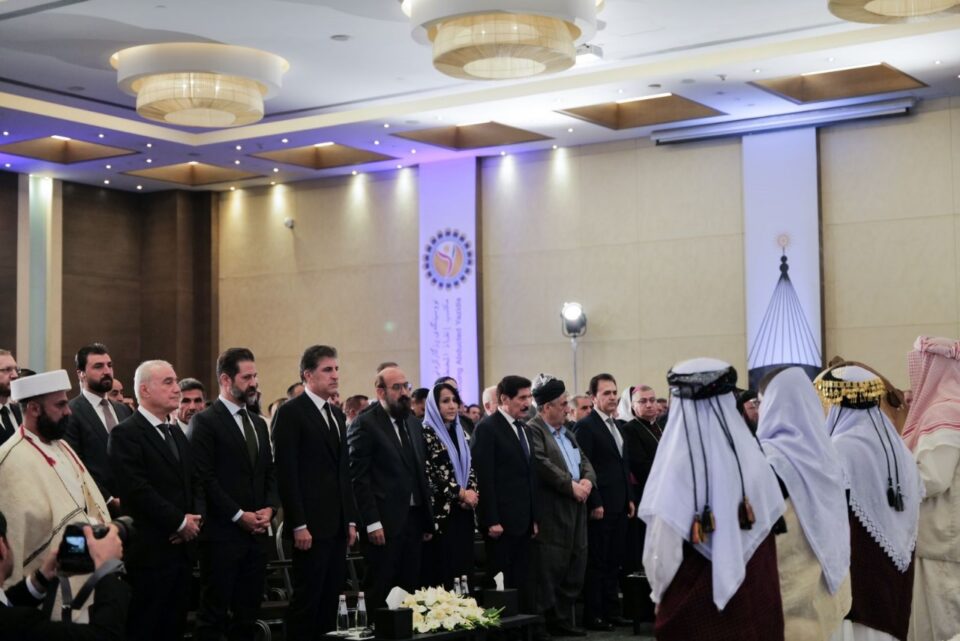The commemorative events coincided with ongoing appeals for the reconstruction of Sinjar, the region that was devastated during the ISIS genocide. The destruction of homes, infrastructure, and essential services has left many Yazidis displaced and struggling to rebuild their lives. Efforts to reconstruct Sinjar are critical not only for restoring the physical landscape but also for revitalizing the community and providing a sense of normalcy and hope for the future.
Kurdistan Region President Nechirvan Barzani attended the 10th Commemoration of the Yazidi Genocide on August 3, an event organized by the University of Kurdistan-Hewler in collaboration with the Office for Rescuing the Abducted Yazidis in Erbil. The ceremony saw the participation of the Iraqi President’s representative, the representative of the Kurdistan Region’s Prime Minister, KRG Deputy Prime Minister Qubad Talabani, the Mir of the Yazidis, Baba Sheikh, the Head of the Kurdistan Region Judicial Council, as well as various officials from both Iraq and the Kurdistan Region, alongside numerous diplomats and Yazidi representatives.
“The genocide of the Yazidis, in our time, was an unspeakable tragedy that deeply shook the very foundations of humanity across the world. This devastating event marked a pivotal juncture in the history of Kurdistan and Iraq, underscoring the urgent need for heightened vigilance and collaboration within the international community to prevent such atrocities from occurring in the future,” the President of the Kurdistan Region said in his speech at the commemoration.
A crime of a century
On the third day of August 2014, a ruthless crime transpired against the Yezidis, an ancient people in Iraq’s Kurdistan Region, exceeding their most dreadful fears and representing one of the bleakest chapters in their past. On that day, militants associated with the Islamic State in Iraq and Syria (ISIS, also known as Da’esh) launched an assault on the Yezidis in Sinjar district, situated in the northwest areas of the country. The militants carried out brutal executions of men, while kidnapping and trafficking women who were subjected to sexual violence, physical abuse, and forced labor. Subsequent investigations by the United States Holocaust Memorial Museum and the United Nations Independent International Commission of Inquiry on Syrian Arab Republic later determined that ISIS was actively involved in perpetrating genocide, war crimes and crimes against humanity.
Hussein Qaidi, the director of the Office for Rescuing Abducted Yazidis, says that unofficial estimates indicate that between 120,000 and 130,000 Yazidis have departed from Iraq since the occurrence of the genocide. This office operates under the auspices of the Kurdistan Region Presidency and was founded in 2014 in response to the genocidal actions perpetrated by ISIS in the Yazidi region of Sinjar.
Following the onslaught, over 5,000 Yezidis were systematically murdered, 400 of them brutally killed in Kojo village alone. A total of 83 mass graves have been uncovered since. But as of now, more than 1,200 Yezidi women and girls, as well as nearly 1,400 men and boys, are still unaccounted for. Out of a population of nearly half a million,135,000 Yezidi refugees endure harsh living conditions in camps, and another 189,000 have been displaced to the Kurdistan Region after fleeing Sinjar. More than 2,700 children have been orphaned and thousands more have been forced to seek refuge in Europe and other nations, leading to separation from their homeland and loved ones.
“It is imperative to uncover the fate of those who remain missing and to offer relief to their families, who continue to endure the anguish of prolonged uncertainty. I hereby assure the Yazidi community that our office will tirelessly persist in its efforts to rescue all abducted Yazidis until none remain in captivity,” Kurdistan Region President said.
“Mitigating the impact of genocide is a shared responsibility for the people of Iraq, the Kurdistan Region, and the global community. Addressing the psychological, social, human, economic, and environmental aftermath of genocide is a challenging, ongoing endeavour that requires exceptional proficiency, expertise, and a sense of urgency. There is no alternative but to persist and triumph in this undertaking,” he said.
Rescuing theabducted continues
On a more hopeful note, 1,208 women, 339 men, and 2,023 children have been successfully rescued through the Office of Rescuing Abducted Yezidis in Erbil. The President of Kurdistan Region said that until every kidnapped Yezidi is accounted for, rescue operations will persist in locating and bringing them to safety.
The implementation of the Sinjar Agreement
The Kurdistan Region President says that the plight of the Yezidis has consistently been a focal point in Kurdish dialogues with global stakeholders and officials. Fortunately, there is now an international consensus on acknowledging the genocide of the Yezidis, which is gaining momentum. However, there remains a lack of consensus within Iraq regarding the resolution of the crisis in Sinjar, resulting in ongoing injustices against the people in that area. The President of Kurdistan Region further says it is crucial at this juncture to urge the parliament, government, and political parties in both the Kurdistan Region and Iraq to convene a special session to monitor the progress of previous decisions and address the situation in Sinjar swiftly. Therefore, it is essential for the parliament and all factions in the Iraqi legislature and federal government to take concrete actions to stabilize the situation in Sinjar.
The October 2020 Sinjar Agreement, mediated by the United Nations between Baghdad and Erbil, aimed to address the security and administrative void left after the defeat of ISIS by facilitating cooperation between the federal and Kurdish regional governments in overseeing Sinjar. This newly established administration and security framework were created with the aim of aiding the repatriation of displaced persons. Although there have been advancements, the agreement has only been partially executed.
The agreement’s execution will clear the path for the repatriation of the inhabitants of Sinjar and its environs. For residents to live in harmony in Sinjar and its vicinity, all non-Sinjar forces must vacate the area, and the administration and safeguarding of Sinjar should be entrusted to the locals and a lawful authority.
Jawad Qadir

